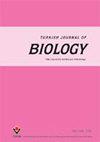Genetic engineering of an industrial strain of Streptomyces clavuligerus for further enhancement of clavulanic acid production
IF 0.9
4区 生物学
Q3 BIOLOGY
引用次数: 17
Abstract
An industrial clavulanic acid (CA) overproducer Streptomyces clavuligerus strain, namely DEPA, was engineered to further enhance its CA production. Single or multiple copies of ccaR, claR (pathway-specific activators), and cas2 (CA synthase) genes under the control of different promoters were introduced into this strain. CA titers of the resulting recombinants were analyzed by HPLC in a dynamic fashion and compared to the vector-only controls and a wild-type strain of S. clavuligerus while their growth was monitored throughout fermentation. The addition of an extra copy of ccaR, under control of its own promoter or constitutive ermE* promoter (PermE*), led to 7.6- and 2.3-fold increased volumetric levels of CA in respective recombinants, namely the AK9 and ID3 strains. Its highly stable multicopy expression by the glpF promoter (PglpF) provided up to 25.9-fold enhanced volumetric CA titers in the respective recombinant, IDG3. claR expression controlled with its own promoter or ermE* and glpF-mediated amplification in an industrial strain brought about only about 1.2-fold increase in the volumetric CA titers. An extra copy of cas2 integration with PermE* into the S. clavuligerus DEPA genome led to 3.8-fold higher volumetric CA production by GV61. Conclusively, multicopy expression of ccaR under PglpF can result in significantly improved industrial high-titer CA producers.为进一步提高棒草酸产量而对棒草链霉菌工业菌株的基因工程研究
为了进一步提高克拉维酸(CA)的产量,设计了一种工业用克拉维酸高产链霉菌菌株,即DEPA。在不同启动子的控制下,将单个或多个拷贝的ccaR、claR(通路特异性激活剂)和cas2(CA合成酶)基因引入该菌株。通过HPLC以动态方式分析所得重组体的CA滴度,并将其与仅有载体的对照和棒杆菌的野生型菌株进行比较,同时在整个发酵过程中监测它们的生长。在其自身启动子或组成型ermE*启动子(PermE*)的控制下,添加额外拷贝的ccaR,导致各自重组体(即AK9和ID3菌株)中CA的体积水平增加7.6倍和2.3倍。其通过glpF启动子(PglpF)的高度稳定的多拷贝表达在各自的重组体IDG3中提供了高达25.9倍的体积CA滴度增强。在工业菌株中用其自身启动子或ermE*和glpF介导的扩增控制claR表达仅使体积CA滴度增加约1.2倍。cas2与PermE*的额外拷贝整合到S.clavuligerus DEPA基因组中,导致GV61产生3.8倍的体积CA。总之,在PglpF下多重拷贝表达ccaR可以显著改善工业高滴度CA生产商。
本文章由计算机程序翻译,如有差异,请以英文原文为准。
求助全文
约1分钟内获得全文
求助全文
来源期刊

Turkish Journal of Biology
BIOLOGY-
CiteScore
4.60
自引率
0.00%
发文量
20
审稿时长
6-12 weeks
期刊介绍:
The Turkish Journal of Biology is published electronically 6 times a year by the Scientific and Technological
Research Council of Turkey (TÜBİTAK) and accepts English-language manuscripts concerning all kinds of biological
processes including biochemistry and biosynthesis, physiology and metabolism, molecular genetics, molecular biology,
genomics, proteomics, molecular farming, biotechnology/genetic transformation, nanobiotechnology, bioinformatics
and systems biology, cell and developmental biology, stem cell biology, and reproductive biology. Contribution is open
to researchers of all nationalities.
 求助内容:
求助内容: 应助结果提醒方式:
应助结果提醒方式:


